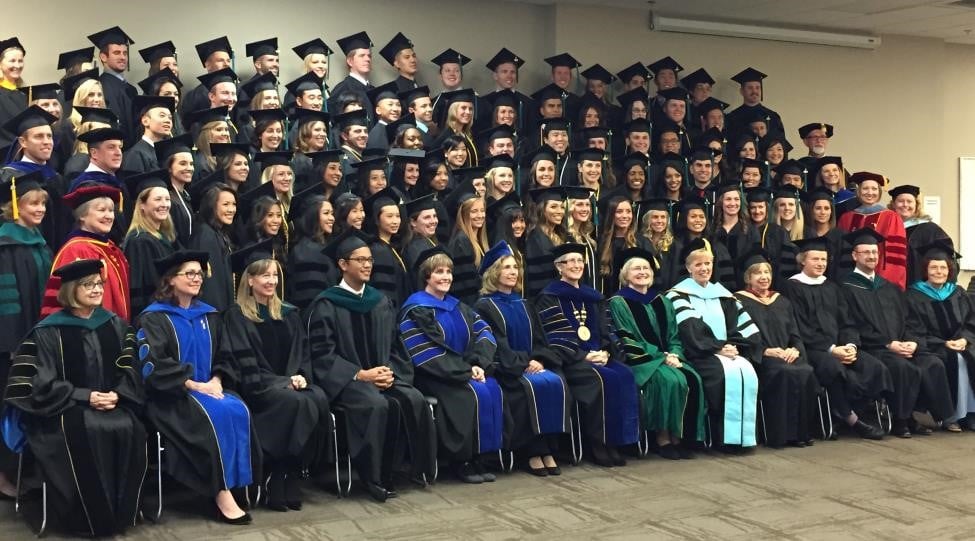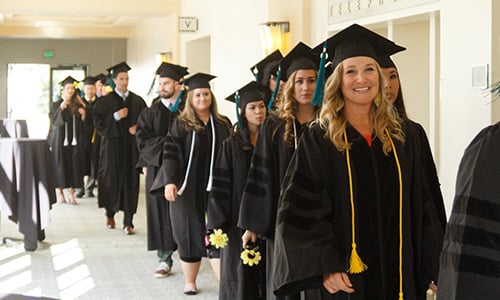
Healthcare leaders attending the Healthcare Financial Management Association (HFMA) Leadership Summit in Nashville, TN, from May 4 to 6 will have a unique opportunity to explore the power of artificial intelligence (AI) in healthcare communication and inclusion.
Elisabeth McGee, PhD, DPT, MOT, MTC, CHSE, Senior Director of Clinical Learning and Innovation and Kathy Wood, PhD, FHFMA, Senior Program Director, College of Health Sciences, from the University of St. Augustine for Health Sciences (USAHS), will present two thought-provoking sessions offering innovative tools and strategies to enhance leadership communication and create a sense of belonging in healthcare environments.
Dr. Wood is a Fellow of the Healthcare Financial Management Association (FHFMA). USAHS partners with HFMA, which has 100,000 members, and collaborates with them on content development and certification for its Healthcare Leadership and Business Certification, as well as USAHS Graduate Certificates.
Leveraging AI for effective healthcare communication
In their session, “Education and Communication for Staff and Patients through AI,” Dr. McGee and Dr. Wood will highlight how AI reshapes communication strategies for healthcare professionals and patients. They will showcase technologies for internal and external communication and ask the audience: Do you resist technology or embrace it and look forward to what’s next?
As AI advances, it streamlines workflows, boosts efficiency and ensures clarity in healthcare interactions. The presenters will also discuss the risks of AI in the workplace and how to use it responsibly.
“AI has the potential to revolutionize how we communicate within healthcare systems, whether drafting emails more efficiently, building chatbots for patient inquiries or using AI-driven simulations for professional development,” says Dr. Wood. She emphasizes AI’s value in reducing redundancy, allowing healthcare professionals to focus on quality care.
Dr. Wood explains, “This offers an opportunity to use various tools—for patients, employees, community outreach and beyond. With everyone being asked to do more with fewer staff and lower budgets, time is our most valuable resource.”


Want to know more about our Graduate Certificates?
Program InformationHow to ApplyRequest Information
Dr. McGee says, “At the University, we’re leveraging AI to create interactive virtual simulations that allow students to practice difficult conversations with patient avatars. These tools help future healthcare leaders refine their communication skills and therapeutic approaches in a safe and formative environment.”
The presenters will introduce an innovative tool during the session. “For this conference, we’ve built out a chatbot focused on building communication skills and allowing leaders to use the power of generative AI to practice different conversations with employees or have virtual simulation encounters to learn how to approach conversations constructively,” Dr. McGee says.
The goal is to help participants apply AI learning encounters to real-life situations, underscoring how technology creates opportunities for better outcomes with patients and employees in an evolving society.
Dr. McGee says, “Generative AI has the potential to revolutionize how we train leaders in the workforce. It provides 24/7 access to training and the ability to create immersive virtual scenarios, like the chatbot. A critical piece is leveraging large language learning models, which depend on well-built prompts and inputted data. This allows individuals to refine and personalize their training experience.”
The session will explore various AI applications in healthcare communication, including:
- Communication tools for managing teams
- AI-driven tools to enhance staff and patient interactions
- Audience polling and simulations to demonstrate AI’s capabilities
Fostering AI for inclusivity in healthcare
Inclusion remains critical in healthcare, and the USAHS team will also present a second session titled “Seeing, Believing, and Guiding Inclusion Efforts.” This session will focus on cultivating a culture of belonging and utilizing AI to support inclusive healthcare practices.
The presenters will explore how healthcare leaders engage with employees, patients, providers and stakeholders, both similar and different from themselves. Participants will learn to recognize when they aren’t fully embracing these differences in ways that foster inclusion and how to guide their actions to ensure exceptional experiences for all.
“We will focus on AI as a tool for inclusive language, addressing sight and physical limitations, supporting diverse needs and addressing social determinants of health, including access, familiarity, financial barriers and education,” Dr. Wood says.
Attendees will gain insights into:
- Identifying barriers to inclusivity in healthcare settings
- Utilizing AI tools to guide inclusion efforts
- Understanding strategies to help staff foster an inclusive work environment
Dr. McGee highlights USAHS’ initiatives in this area, stating, “We’ve developed AI-driven chatbots that guide students through culturally responsive communication. These tools help healthcare professionals approach patient interactions with sensitivity and awareness, ultimately improving engagement and outcomes.”
USAHS has created a generative AI hub for faculty and staff, offering best practice guidelines and a variety of tools. The USAHS AI Innovators Challenge encourages experimentation with generative AI technology to assess their impact on outcomes and adopt scalable technologies across programs.
Join the conversation at the 2025 HFMA Leadership Summit
Open to all healthcare finance professionals, the summit attracts over 600 chapter leaders and offers leadership sessions and networking to navigate tomorrow’s healthcare landscape. USAHS is a sponsor, highlighting its commitment to advancing healthcare leadership through future-focused education.
What’s a key takeaway for healthcare leaders regarding AI’s role in communication, and how can they begin integrating it into their organizations?
Dr. McGee says that healthcare leaders can begin by leveraging these technologies to enhance organizational communication. “AI enhances training with virtual simulations, chatbots and generative AI for better decision-making, especially in analyzing medical data. It improves patient engagement, tailors healthcare plans and enhances communication, ultimately advancing and personalizing care,” she explains.
“We want healthcare leaders to embrace AI as a tool that enhances efficiency, improves patient experiences and drives better outcomes,” says Dr. Wood. “By understanding how to integrate AI responsibly, leaders can optimize communication, streamline operations and foster inclusive environments.”
Attendees will leave with actionable strategies to leverage AI in their organizations, ensuring they stay at the forefront of innovation in healthcare leadership.
Visit the HFMA event page to learn more about the summit.








